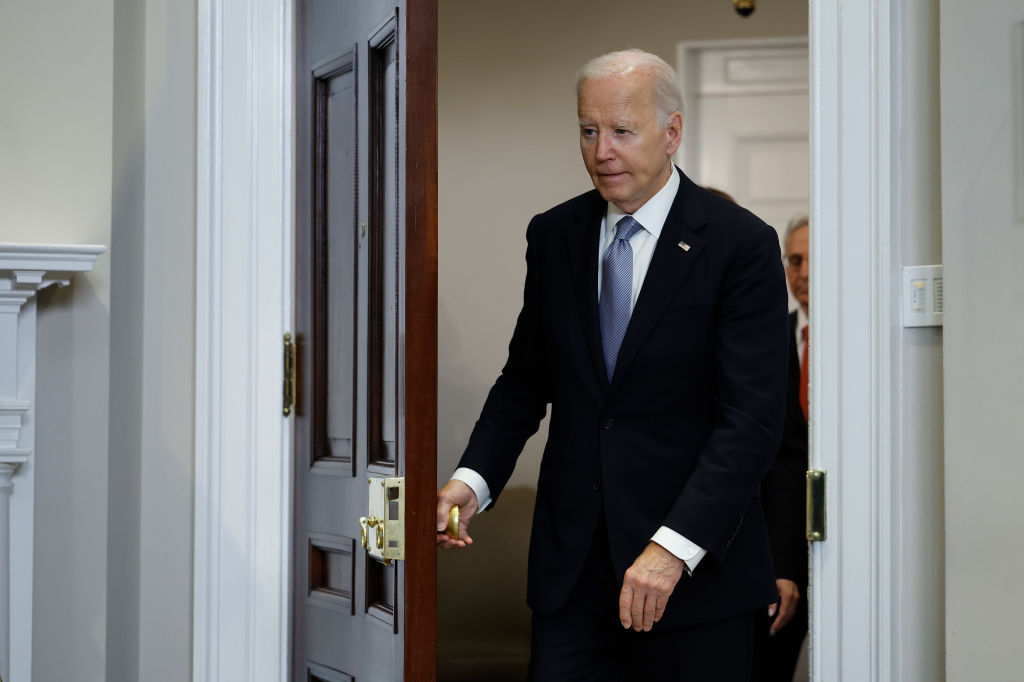It took three brutal weeks for Democrats to force President Joe Biden out of his reelection bid.
They did it one news cycle at a time. Biden or his team would make the most adamant possible declaration of his continued candidacy, which would be met by leaders in his party pretending he hadn’t said anything at all, another round of damaging leaks, and then the next name to appear on the list of officials publicly calling on him to step aside.
On Friday, July 5, Biden told ABC News that the only person who could talk him out of running was the “Lord Almighty.” On Sunday, Rep. Adam Schiff, who does not meet that job description, told NBC News that Biden should “take a moment to make the best-informed judgment.” Then came the leaks about what was said on a call about a groundswell of demands for Biden to leave.
On Monday, July 8, Biden put his foot down, telling congressional Democrats in a letter, “The question of how to move forward has been well-aired for over a week now. And it’s time for it to end.” But on Wednesday of that week, former House Speaker Nancy Pelosi was on NBC News saying, “It’s up to the president to decide if he is going to run. We’re all encouraging him to make that decision. Because time is running short.”
Uh, what?
What you may note here is the degree to which this was all playing out in the news media, with Democrats using the press—directly and through leaks—to keep the pressure on the president.
Indeed, the effort started in the press with an editorial in the New York Times the day after Biden collapsed in his June 27 debate with former President Donald Trump. The editorial even outlined the program for pushing Biden out: “The confidants and aides who have encouraged the president’s candidacy and who sheltered him from unscripted appearances in public should recognize the damage to Mr. Biden’s standing and the unlikelihood that he can repair it.”
Check.
We can’t know for sure whether Biden would still be his party’s presumptive nominee without the Times coming down so fast, hard, and clearly, but there’s a case to be made that the paper’s editorial lit the fuse that blew up Biden’s bid. It’s easy to imagine that if after the debate, the editorial board had reverted to the pre-existing line that Biden “must do better” to address concerns about his infirmity, the president might still be in the race today.
At a time when we are daily reminded of the waning power of traditional media, here’s America’s biggest newspaper calling for the end of a president’s campaign and actually getting it—despite his strenuous objections.
But it can only work with a Democrat.
The media has been trying to get rid of Trump since he was about to lock up the Republican nomination in the spring of 2016. For eight years, the press has landed broadside after broadside on Trump to little negative effect, and some considerable benefit to the former president.
We can partly explain that by the fact that Republicans despise the mainstream media (the feeling is often mutual). And it’s hardly just Trump.
Indeed, being attacked by the New York Times is often hugely beneficial to a Republican politician. The GOP’s 2008 vice presidential nominee, Sarah Palin, made a decade-long career in national politics out of being targeted by the “lamestream media,” and attacks on her when she was introduced as presidential nominee John McCain’s pick helped insulate Palin from obvious concerns about her readiness and steadiness among Republicans. If all Republican voters know about a politician is that the media is against her or him, that’s probably enough for most to start with a positive assessment.
But we wouldn’t expect right wingers to care what left-leaning outlets think any more than Democrats care about the opinions of conservative media. The Palin effect certainly works in reverse.
But what about conservative media and Republicans? Can the biggest voices on the right shape the behavior of GOP politicians in the way that the Times & Co. do to Democrats?
Not a chance.
The closest thing to the New York Times’ editorial board on the right is the Wall Street Journal, with the most influential and most esteemed opinion section in Republican circles. The paper itself is big, impressive, and well respected for its reporting; read daily not just by powerful Republicans but across the political spectrum.
Here’s what its editorial board said on January 7, 2021, calling for then-President Trump to resign:
In any case this week has probably finished him as a serious political figure. He has cost Republicans the House, the White House, and now the Senate. … He has refused to accept the basic bargain of democracy, which is to accept the result, win or lose. It is best for everyone, himself included, if he goes away quietly.
More than a year later, when Congress held hearings on Trump’s effort to steal a second term and for sending a mob to the Capitol to disrupt the transfer of power, the Journal came back:
Mr. Trump took an oath to defend the Constitution, and he had a duty as Commander in Chief to protect the Capitol from a mob attacking it in his name. He refused. … In the 18 months since, Mr. Trump has shown not an iota of regret. …
Character is revealed in a crisis, and [former Vice President Mike Pence] passed his Jan. 6 trial. Mr. Trump utterly failed his.
Lots of Republicans in Washington agreed entirely with these sentiments, but the encouragement of the highest-circulation national newspaper did little, if anything, to help them find the courage to do to Trump what Democrats just did to Biden.
When the Journal’s sister publication, the New York Post, came after Trump for his disastrous role in the Republican’s 2022 midterm debacle, it was so scorching that it even made news in other outlets. The paper repeated the call for Trump’s exit, but in tabloid terms: “Yo, Toxic Trump: Scram,” and worked to anoint a replacement in Florida Gov. Ron DeSantis.
But the effort went nowhere as not only Republican voters, but party leaders, caved in to a candidate who most knew was both a bad bet electorally and potentially dangerous if returned to the White House. Democrats read the Times calling on them to start to push Biden out and got to work. Republicans saw the same thing in the Journal and the Post and said, “Wouldn’t it be nice.”
We can explain the differences in many ways, especially the strong preference for Republican voters for nontraditional media, particularly Facebook and other social media platforms, but also the typically rebellious nature of the Republican electorate. A party arranged around individual rights and resentment of authority isn’t likely to care too much what elites and elite publications say.
But, whatever the causes, the net effect is that with a weak party apparatus and low trust in the media among their voters, Republicans lack the ability to solve the problem of an unpopular nominee whom many Americans believe is unfit for office.
Democrats often complain about the “bed-wetting” that the party’s dependence on mainstream media can cause. But in the matter of Biden and Trump, the press did for the blue team what it couldn’t for the GOP.










Please note that we at The Dispatch hold ourselves, our work, and our commenters to a higher standard than other places on the internet. We welcome comments that foster genuine debate or discussion—including comments critical of us or our work—but responses that include ad hominem attacks on fellow Dispatch members or are intended to stoke fear and anger may be moderated.
With your membership, you only have the ability to comment on The Morning Dispatch articles. Consider upgrading to join the conversation everywhere.